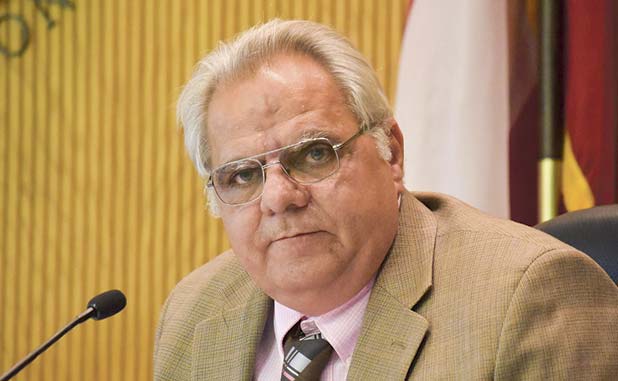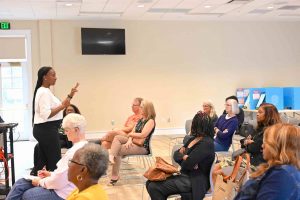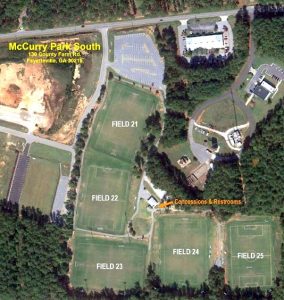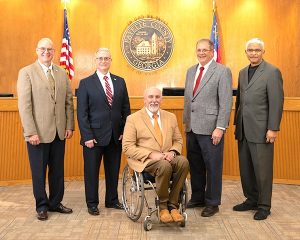There may be a change coming in the way public comments are handled at meetings of the Fayette County Commission. The result could mean some sort of time limit on those public comments at commission meetings.
Commissioners at the Jan. 24 meeting directed the county attorney and staff to “re-look at the policy on public comments to make them more in-line with best practices recommended by the Association of County Commissioners of Georgia as well as Georgia law.”
Chairman Randy Ognio at the outset of the discussion on public comments began saying, “I think we might look at changing that if it’s okay with everybody and limiting it to five minutes per comment just to speed the meetings up.”
Today, it is not uncommon for meetings of the Fayette County Commission to run up to six hours.
His comment was followed by a motion to affect that change. Following a question by Commissioner Eric Maxwell pertaining to public hearings, Ognio clarified his remarks noting the idea to have 10 minutes per side of an issue during public hearings.
“In times past, I know that we had limits to each side, and each side was always allowed an equal amount of time. Right now it’s not working that way, and I feel like it would be better suited if we set up a time limit,” Ognio said.

“I concur completely,” Commissioner Edward “Edge” Gibbons said in response.
County Administrator Steve Rapson noted that there were two issues involved. One of those deals with public comments during a public hearing, with the second dealing with public comments not involved in public hearings.
County Attorney Dennis Davenport clarified, saying state law requires minimum of 10 minutes for other issues, such as hearings related to alcohol permits.
“You have that same 10 minutes in there, but you also had unlimited public comments. So it would make no sense to limit (the time) in a public hearing then let them talk all day under public comments. So the 10 minutes was removed,” Davenport said, noting the change in prior years that led to unlimited comment time. “So if you want to put a 10-minute limit back in place on public hearings for zoning purposes, that would need to go to the Planning Commission and back up to the Board of Commissioners. But there are other public hearings that aren’t just for zoning. Those can be treated differently, much like public comments. So you’re talking about when a member of the public comments on something other than a public hearing.”

Ognio then confirmed that was his intention.
Commissioner Charles Rousseau in his comments encouraged commissioners to look at the nuances, suggesting that to take up the issue at the end of a meeting might do a disservice. He asked Davenport to look at the nuances pertaining to state law so the board can arrive at a reasonable change in the policy.
Rousseau noted that, for a number of years, public comment has been unlimited.
“I don’t think any of us are trying to cut people off in their ability to speak, but Dennis

needs to tell us which items require 10 minutes. Now if we want to go greater than 10 minutes, I guess we go greater than 10 minutes,” said Commissioner Eric Maxwell. “But we need to know from Dennis, before we vote on this, what is the required time.”
Maxwell noted that there have been, on at least three occasions, where “We were here for several hours listening sometimes to the same argument and sometimes 15 minutes for the same argument. And Randy, I think that what you’re trying to address … we want to hear (what people have to say), but we don’t want to hear it 15 times from 15 different folks saying the exact same thing. If you’re saying something new, we’re happy to receive that information.”
Clarifying his point, Ognio said, “What I want to do is give staff direction for all public hearings so they can bring it back to us. But the public comments, we just want to limit each person to five minutes, and no time limit for the number of people.”
Gibbons responded, saying he would like to see a time limit for the total number of public speakers. He referenced a recent article comparing boards in several metro Atlanta counties.
“The only one that was unlimited was Cobb County. The others had a 30-minute time limit for public comments, and I think that’s pretty reasonable,” said Gibbons.
Gibbons, in response to Rousseau saying he was not prepared to vote at the meeting, agreed that he, too, was not expecting to vote at the Jan. 24 meeting.
“What I do think is reasonable is that all of us are more than willing to make ourselves available as individuals, along with the expert staff,” said Gibbons. “Because a lot of people, as Eric mentioned earlier, show up (at meetings) and what they’re looking for is an answer. And, unfortunately, during public comments we don’t answer. So I think a much better venue, and I would encourage the public to do this, is to contact us and tell us what their problem is. We get contacted by the public. And we’ll set up a meeting with (county) staff that can provide a better answer than me looking back at (the person) from the dais as that person gives public comments for 20 minutes.”

Ognio at the end of the discussion said the issue is something that commissioners need to look at. He then withdrew his original motion limiting the time for public comments. Gibbons then made a motion to direct the county attorney and staff to re-look at the policy on public comments to make them more in-line with best practices recommended by the Association of County Commissioners of Georgia as well as Georgia law.
The motion passed on a 5-0 vote.
Nearly all local government entities have versions of a time limit on public comments, as did the commission until recent years.













Leave a Comment
You must be logged in to post a comment.